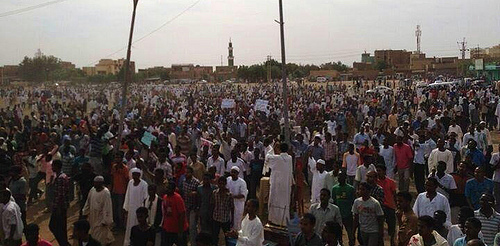
Editor's Note: This op-ed, written by Enough Project Co-Founder John Prendergast originally appeared on the Daily Beast.
Twenty-four years and three months is a long time to stay in power, even for a dictator in the Horn of Africa.
In every one of those 24 years, commentators have predicted that the demise of General Omar al-Bashir’s reign over Sudan was at hand. Yet he has hung on through his ruthless and vast security and intelligence network that has brutally repressed citizen dissent in the cities as well as paramilitary ethnic-based militias that have committed mass atrocities against rural populations accused of supporting a variety of rebellions.
Finally, the long-predicted end may be near. An uprising throughout Sudan’s cities is gaining traction and metastasizing hourly.
Dozens, perhaps hundreds, of protesters have been killed by Bashir’s security services, which are using live ammunition to attempt to quell the unrest.
Young protesters appear to comprise the bulk of those killed so far. (Here is a Flickr account with sometimes graphic photos from the protests.)
These latest killings have occurred in the context of a spiral of popular protests triggered by the removal of subsidies on essential commodities, which has led to a burst of inflation. More deeply, the street action is driven by an explosion of anger after nearly two and a half decades of total and unilateral control of the political life and national economy by Khartoum’s Islamist regime, led by the ruling National Congress Party (known as the NCP).
Regime policies of concentrating political and economic power in the hands of NCP members and their cronies have led the country to economic implosion, making life worse for the average Sudanese. The ruling party’s discriminatory and, in some instances, blatantly racist policies led South Sudan to opt for independence in 2011, and have since fueled raging wars in the “New South” of the Sudan, the historically marginalized regions of Darfur, South Kordofan, and Blue Nile. In these war zones, the NCP regime unleashes daily bombing raids against civilian targets aimed at forcing the population to leave rebel-held areas, supplemented by attacks by the ethnic-based militias as well as obstruction of humanitarian aid and agricultural activities. It is, in total, a blunt form of ethnic cleansing, as vicious and insidious as Slobodan Milosevic’s efforts in the former Yugoslavia. Famine becomes a convenient and cheap weapon of war.
However, although rebellions have raged nonstop in Sudan since Bashir’s coup in 1989, what has been missing is a corresponding urban uprising that complemented the rural wars. Without any pressure in Sudan’s northern cities, the Islamist regime has remained somewhat comfortably in power. That is why this week’s violence is potentially so significant.
The spread of information through the Internet and social media has emboldened protesters throughout Sudan’s cities. The government succeeded in shutting down the Web only for a few hours on Sept. 25, but not permanently. Allegations related to the shooting of unarmed civilians are backed up by hundreds of photos taken by Sudanese activists and relatives of the victims in morgues and hospitals across Sudan. This damning evidence is now available for all to see on the Internet. The regime deploys censors in all of Sudan’s media outlets, making it much harder to verify the number of dead and wounded. These attacks are just the latest page to be added to a long catalogue of crimes against humanity and war crimes committed by Bashir’s regime.
Read the full op-ed on the Daily Beast.
Photo: Protesters gathered in Sudan (Girfinia)

